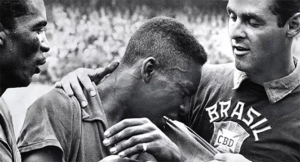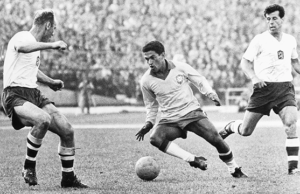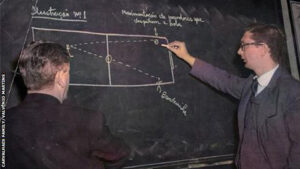
In the summer of 1958 a 17-year-old Brazilian took international football by storm.
Six goals in four games. A hat-trick in the semi-final. Two more in the final as Brazil claimed the trophy they so desperately craved.
Arriving in Sweden for the World Cup as an unknown, Pelé left as a star who would go on to achieve sporting immortality. But one man within the Brazil camp had argued against him playing.
Professor João Carvalhaes was the team’s psychologist. In stark contrast to his modern-day counterparts, whose remit tends to be strictly focused on supporting players’ performance and mental health, he had real influence over selection.

Pelé’s results in the psychometric tests Carvalhaes applied was the reason for his somewhat dubious advice, which was ignored in this instance. The legendary footballer himself later said of Carvalhaes’ methods: “They were either ahead of their time for football or just odd, or maybe both.”
But beyond doubt is his place in history as a sporting pioneer. Carvalhaes introduced psychology laboratories to South American football almost 30 years before the concept was adopted in Europe.
Back in 1950s Brazil, they wanted all the help they could get.
Brazil’s 1950 and 1954 World Cup campaigns had been torturous. In 1950 defeat in the final by Uruguay at the Maracanã, the spiritual home of Brazilian football, prompted mourning across the country.
The 1954 tournament, held in Switzerland, ended in ignominy as Brazil were reduced to nine men during an ugly 4-2 quarter-final loss to Hungary in a match nicknamed ‘The Battle of Berne’.
While the national team attempted to move on from the emotional trauma, a little-known psychologist was making his entrance into Brazilian domestic football.
Carvalhaes joined São Paulo in 1957, leaving a job training referees for the city’s football federation. The club’s interest was piqued by the psychology laboratory he had founded, the likes of which would not be seen in Europe until AC Milan’s ‘Mind Room’ of the late 1980s.

The lab was built at the federation’s headquarters and housed 10 tests examining cognitive functions such as stereoscopic vision (depth perception). Carvalhaes used the tests to help highlight the skills trainee referees needed to hone before qualifying to officiate professional matches.
After São Paulo won the Campeonato Paulista in 1957, the team’s first state championship since 1953, Carvalhaes was heralded for his role in a selection decision that proved key to victory.
Club director Manoel Raimundo Paes de Almeida said the replacement of regular midfielder Ademar with fellow playmaker Sarara, who then shone in a crunch match with Corinthians, was based on Carvalhaes’ concerns about Ademar’s state of mind.
A year later the Brazilian Sports Confederation (CBD) came calling. Carvalhaes was sked to join the team’s technical committee.
Brazil’s preparations were already under way and Carvalhaes wasted little time in implementing the methods he had employed at São Paulo. During the squad’s pre-tournament camp he conducted an ‘Army Alpha’ test – an adaptation of an American programme designed to assess the intellectual capability of World War One recruits.
While the concepts behind the tests might seem dated in comparison to contemporary psychology theory, they pushed the boundaries of thinking at the time, particularly in a sport that had seen very little, if anything, in the way of psychology-focused interventions.
Carvalhaes was asked to present his findings to the CBD technical committee. The results, much to his consternation, were leaked to the Brazilian media. In a letter to de Carvalho, Carvalhaes alleged that documents were stolen from his briefcase.
The leak led to suggestions that star player Garrincha, whose test results were poor, would fail to make the cut for the World Cup. Carvalhaes was exasperated. The public fallout ran counter to his behind-the-scenes way of working.
But the storm was short-lived. After Garrincha was named in Brazil’s squad, media speculation died down and Carvalhaes travelled to Sweden with the rest of the backroom staff.
The MKP tests, in which players were given a blank sheet of paper and asked to draw whatever came to mind, were based on the theory that expressive muscle movements can help to indicate an individual’s temperament.
Once again, Carvalhaes was applying techniques that had never been used at this level of the game. Once again, he ran into trouble.
“As part of our preparations the team psychologist, Professor João Carvalhaes, had conducted tests on all the players,” writes Pelé in his autobiography, ‘Pelé’.
“We had to draw sketches of people and answer questions to help João make assessments about whether we should be picked or not.
“About me he concluded that I should not be selected: ‘Pelé is obviously infantile. He lacks the necessary fighting spirit.’ He also advised against Garrincha, who was not seen as responsible enough.
“Fortunately for me and for Garrincha, Vicente Feola (Brazil’s manager) was always guided by his instincts, and he just nodded gravely at the psychologist, saying: ‘You may be right. The thing is you don’t know anything about football. If Pelé’s knee is ready, he plays.'”


